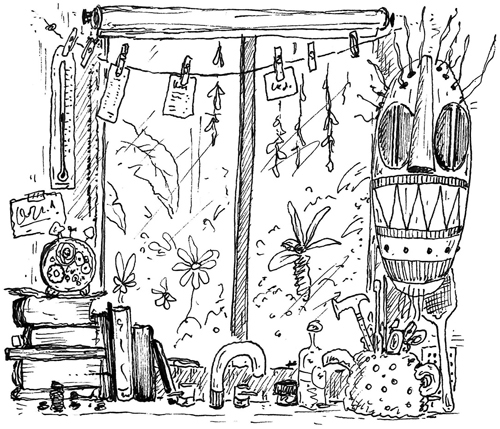
As you can imagine, the meal Uncle Pogo prepared for them both that night was dreadful. Even though lasagna was one of Nelson’s favorite foods in the whole world, the lump on his plate was inedible, bearing little resemblance to the delicious stuff he was used to at home. The meat was a strange wormy-looking gray and tasted exactly the same as Minty’s dog food smelled. The cheese sauce was a gluey white flavorless paste, and the layers of pasta were as tough to chew as a leather belt. It sat there on Nelson’s plate surrounded by a moat of green, watery peas, like the ruins of a tiny castle after a dragon had been along and burned it to a crisp.
Uncle Pogo had registered Nelson’s disgust and realized he had better do something about it. “Sorry. I’m not really used to cooking for other people. There’s a fish-and-chip shop nearby. Would you prefer that?” Nelson tried not to look too excited about this idea, but Uncle Pogo chuckled in recognition.
“Two large haddock-and-chips?” he asked, taking his van keys out of a small compartment on the front of his plastic leg and rising from his chair.
“One’s enough for me,” said Nelson, and his uncle laughed again.
“And ice cream for dessert. What’s your favorite flavor?”
“Chocolate,” said Nelson, and his stomach rumbled in agreement.
“Won’t be long. Watch TV if you like. Bound to be something on.” Uncle Pogo went out of the front door and into the UFO mother-ship blaze of his security light.
The clunk of Uncle Pogo closing the front door triggered the dog to bark like a nutter. Nelson still hadn’t set eyes on the animal. According to his uncle, it had belonged to a chaotic family who used to live across the street. The family had suddenly moved a few weeks ago, leaving the poor dog tied up in the yard (along with several mattresses, an old fridge, and a punching bag). Pogo had felt compelled to rescue the dog, only to find the reason they left it behind was due to its being a complete psycho. After it had shredded some of Pogo’s most valuable objects and bitten his hands and ankle at least a dozen times, Pogo had relegated the beast to the backyard, where it seemed pretty happy.
Nelson got down from the table and walked to the kitchen carrying both of their dinner plates. I say walk, but actually it was more like wading. There was more stuff and clutter inside Pogo’s house than there was in his front yard. Pogo had lived here for fifteen years, and even though the place had three floors, a big living room, dining room, and three bedrooms, he had made his bedroom in the tiny basement so he could use the rest of the house for storage and work space. Everywhere you looked there was something Pogo was either fixing or taking apart to get a better look at it. Old radio sets spread out in all their various pieces, vacuum-cleaner motors opened up for examination, and even computers were dissected. As Nelson scraped the remains of their ghastly meal into a flip-top bin he stared up at the walls, which were covered in African tribal masks, some of them as big as a surfboard, with surprised expressions on their faces and spiky straw for hair. From the kitchen window he could see straight into the greenhouse, which was out of bounds due to its being a miniature Amazonian jungle, as hot and humid as the real thing, complete with insects and a bathtub filled with tropical fish. On Nelson’s tour of the house Uncle Pogo had explained he was trying to continue with his father’s experiments with jungle plants, but by the look of things, his experiments weren’t going so well.
This is the view from the kitchen window into Uncle Pogo’s greenhouse.

After washing and rinsing their plates and cutlery in the sink and leaving them to dry on the draining rack, Nelson made his way back into the living room, past a fully functional red telephone booth, an industrial sewing machine on which lay a half-made kite, and piles and piles of books, and more books, and even more books. Even though there was plenty here to keep Nelson’s mind occupied, he sought the reassuring glow of the TV. As he waited for the screen to warm up, Nelson settled back into Uncle Pogo’s large black chair, which responded instantly by massaging his back, neck, and legs. It felt odd at first, as if the chair didn’t want him sitting in it and was trying to push him out, but by the time a program had appeared on the TV screen Nelson had decided he very much liked the feeling of being kneaded like dough. He scrolled through the channels, past a horse race, past a man holding another man up against a car and telling him he’d had enough of his lies, straight past a baffling commercial for something involving the woman from Pirates of the Caribbean and a motorbike, and then stopped dead at the sight of a face he recognized: John Doodson was standing on the steps of St. Paul’s Cathedral talking to the cameras with his usual infectious charm. Below his face was a caption that read “Prof. J. Doodson. Museum of London.”
“The room, which we believe to be Christopher Wren’s private laboratory, was discovered last night while repairs were being carried out on the cathedral, and I can tell you, in all my years of working for the Museum of London, I’ve never been so surprised by a find. I mean, it’s amazing to think that millions of people have been in and out of this place and no one has ever known about this room.”
The picture cut to video footage of Doody inside the room as a voice-over informed the public that the team behind this discovery was led by ex-musician Professor John Doodson—former keyboard player in nineties techno group Messiaz. Meanwhile, Doody was peeling back the dust sheets that covered the strange objects and explaining what he had found.
Here are some sketches of the things Doody was talking about.
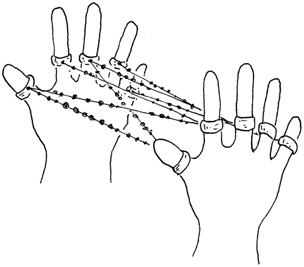
Wren was working on a new kind of musical instrument —little wires that when stretched between the fingers vibrated hundreds of tiny tuned bells.
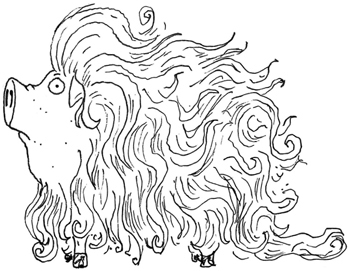
In order to meet the ever-increasing demands for huge wigs (extremely popular at the time), Wren was developing a tonic that when rubbed on pigs would cause them to grow masses of luscious, wavy hair in just a few days.
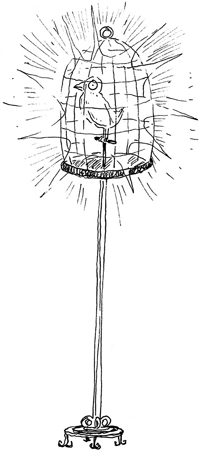
Caged birds were all the rage, but Wren had been working on a special kind of birdseed that when fed to a budgie would make it glow in the dark at night.

“We’ve always known Wren was up to far more than just building a cathedral,” said Doody. “The central staircase here was originally constructed to house a telescope that would have been as tall as the cathedral itself. I mean, this was a man who liked to think outside the box! But what we’ve found here, well, we’ve never seen anything like this stuff before. I mean look at this…”
Doody turned and the camera followed him to the sheet-covered table Nelson had stood on to reach the pipe last night. Nelson winced—his memory of falling back onto it was still fresh in his mind.
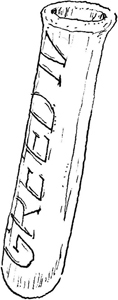
“This is an absolutely amazing piece,” said Doody as he reached for a tray of items neatly displayed on green velvet, as if already in a museum. Among the ancient objects were the seven copper vials. “Yer see, Christopher Wren had all these ideas he was trying out.” Doody chuckled as he held up two of the copper vials. One of them had the word GREED etched into the copper; the other had the word ENVY.
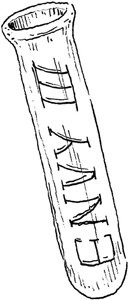
“There are seven of these, one for each of the so-called seven deadly sins,” explained Doody as he peeled back a sheet to reveal the table, but instead of revealing a piece of flat wood, the table was covered in hundreds and hundreds of tiny needles—all pointing upward and arranged in spirals and intricate twisting patterns. Nelson’s eyes widened. He clearly remembered falling onto that table last night. He’d slipped back and slammed right down on it when the pipe had burst. How on earth had he not realized it was covered in nasty-looking spikes?
“So the idea was, you’d lay yourself down on here on this lovely bed of needles—not exactly comfy, I’d imagine—and somehow these things would draw the seven deadly sins out of your soul and collect them in these copper vials, for safekeeping, like. Luckily they seem to be empty.” He chuckled, and the picture cut back to the newsroom to where the anchorman was enjoying a polite chuckle too. “Professor John Doodson there, on today’s incredible discovery of Sir Christopher Wren’s secret test chamber at St. Paul’s Cathedral. And in other news today…” continued the anchorman, but Nelson’s mind was off racing all over the place.
Why hadn’t it hurt him to fall on those spikes? In fact, how come he remembered it feeling so soft? Surely it would have left him covered in cuts or puncture wounds? Nelson’s mind departed from the news report and turned instead to his own body. He pushed back the sleeve of his hoodie until it reached his elbow and turned his arm around. Nothing. His skin looked normal—not a scratch in sight on either arm. While Nelson’s mind was replaying the moment his body had fallen onto all those needles, the news program was drawing to a close.
“And now the weather. It’ll be another rainy day for most of the southeast, with showers expected around noon and spreading…”
Nelson suddenly remembered the plastic poncho he had been wearing. Maybe it had protected him from the needles? It was still hanging on the banister rail, and when Nelson lifted it up for close inspection he noticed there were tiny pinpricks all over the poncho, making it utterly useless for the next time it rained. “That’s so weird,” said Nelson to himself, and he was right, it was weird. Just to be sure the spikes hadn’t gone all the way through his clothes and stuck into his back, Nelson pulled his hoodie over his head and yanked up the sleeves of his T-shirt.
“… Scattered showers for most of the north, although tomorrow should be clearer with the promise of some sun…” continued the happy weatherman.
Twisting his neck as far as it would go, Nelson strained to get a good look at the back of his shoulders, and just under the T-shirt he caught a glimpse of a patch of little red dots on his skin. Not a random scattering of dots, but a pattern. His neck protested—it didn’t like being twisted like this—so Nelson gave his head a good shake before twisting it the other way. There was exactly the same pattern on the other shoulder too. All Nelson needed was a mirror to get a good look at his own back, but it seemed a mirror was the one object his uncle didn’t possess.
“… By Tuesday much of Scotland can expect snow…”
There was a kettle in the kitchen. It was reflective but tarnished and his uncle had covered it in those tiny stickers you get on bananas and apples. Nelson peeled off as many as he could, gave it a wipe, and lifted the back of his T-shirt.
“And finally our top stories once again,” said the newsreader, turning to a different camera that swooped toward him like a bird as the wall behind him lit up with images to accompany each story he recounted.
At first Nelson didn’t understand what he was looking at because the kettle’s distorted reflection made his body look like a long pink tube, but one thing was very clear: the bright red pattern that covered his entire back.
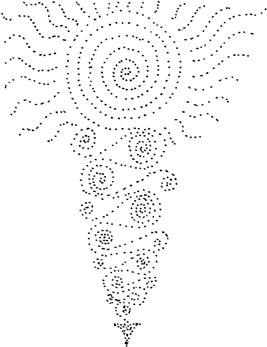
Pinpricks. Thousands of them. An intricate red tattoo that spread from his neck all the way to his lower back. And yet he didn’t feel a thing, not even an itch. How on earth can you fall heavily onto a bed of needles that puncture your skin and not feel it? In fact, quite the opposite—Nelson clearly remembered feeling fantastic. How weird.
“… As the search continues for British schoolgirl Celeste Green, Spanish police say they fear the worst…” Nelson’s attention was pulled away from the image of his back, as the news story seemed to grab him by the throat and smack him around the face.
He ran back into the front room, and there was Celeste’s image. Her big smiling face in a photo taken in their backyard last year. Nelson could only manage a tiny gasp in response. His body froze, and time with it. As suddenly as her face had appeared on the screen it was gone, replaced by Doody talking about St. Paul’s again, but Nelson didn’t hear a word he said. His sister’s face was burned onto his brain with the word “Missing” in large red letters below. He knew what “fear the worst” meant. They thought Celeste was dead. The news was so awful that it sent a sharp stab of pain into Nelson’s chest, right where his heart lived. He opened his mouth to cry out, and a bloodcurdling scream filled the entire house. This wouldn’t have been so awful if Nelson had been the one screaming, but the horrible noise wasn’t coming from him—it was coming from outside the house.